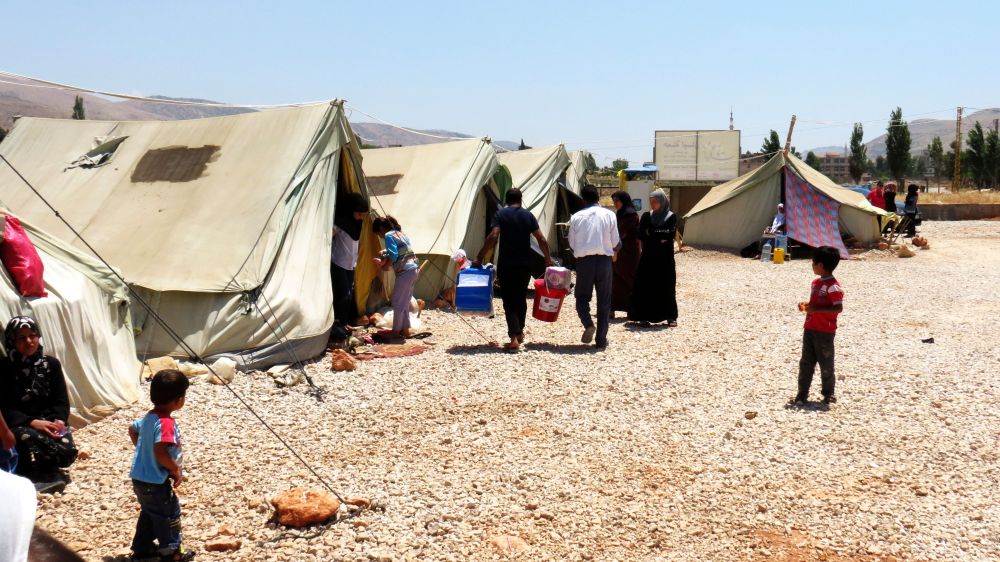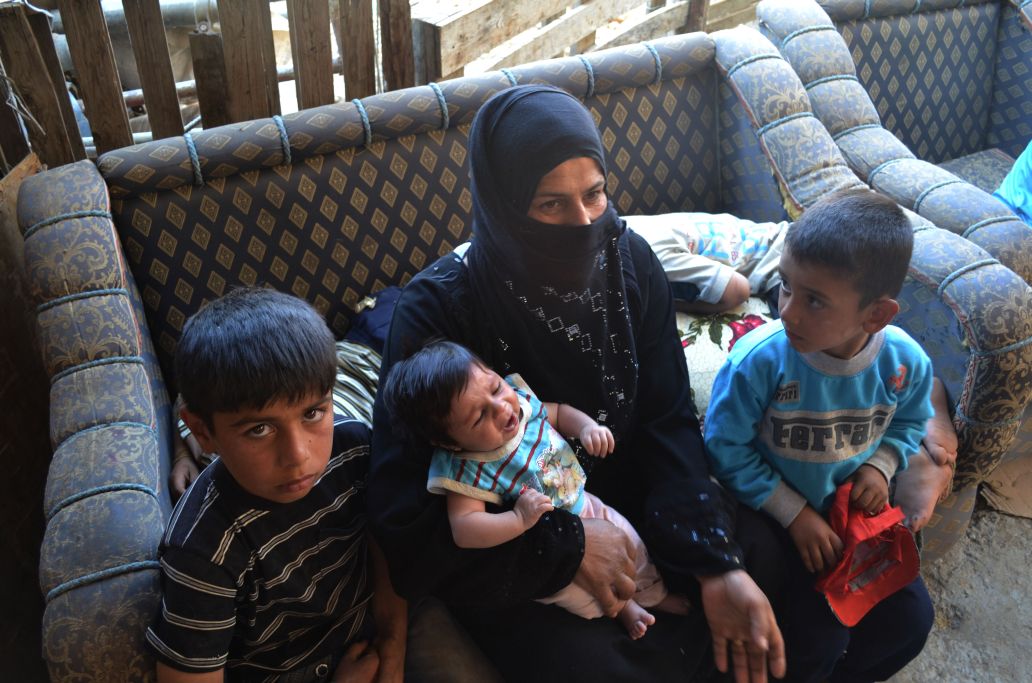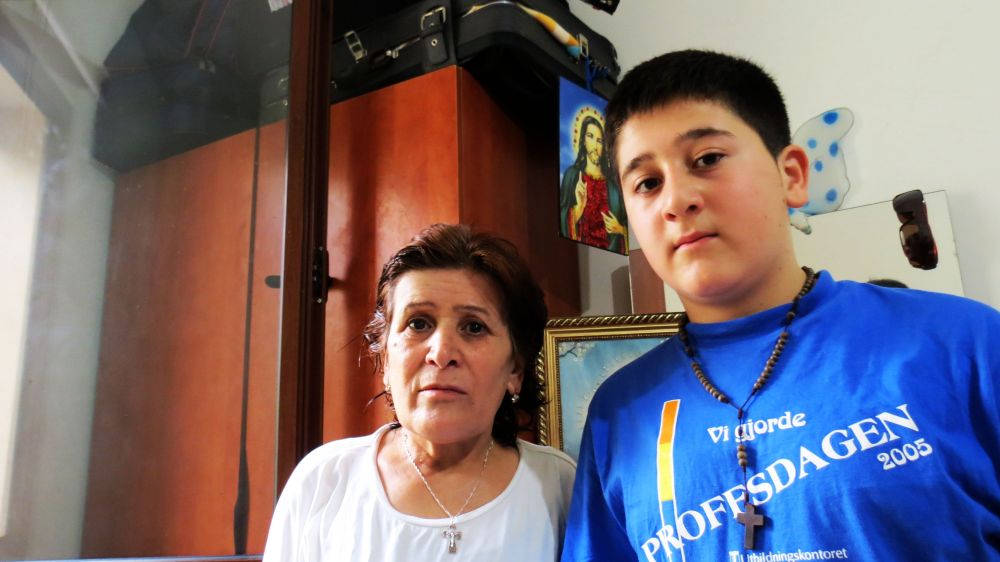By Patrick Nicholson
Since the start of the conflict in 2011 in Syria, over 1.7 million people have fled to neighbouring countries. Lebanon has received the largest number of refugees in the region. Although there are half a million Syrian refugees registered in Lebanon, the true number is estimated to be beyond 1 million.
Every day, Caritas staff meets hundreds of new arrivals from Syria, each with their own account of the horrors they’ve seen. Sometimes it can be overwhelming. “When I hear all their stories, it feels like my head will explode,” said Mireille, a Caritas social worker in Beirut.
Suitable accommodation has long since run out in the small country, and the refugees must find anywhere they can for shelter. Caritas Lebanon is providing aid and care to the Syrian refugees wherever they might be.
Khatar
Khatar (42) lives with her six children in a cowshed on a farm in the Bekaa Valley. The small room of wood and metal sheeting is home to 25 people altogether, almost all women and children.
“It’s horrible,” she said. “A sewage pipe runs inside the shed. It leaks when it rains. The children are very sick because of the bad hygiene. But it’s either here or we live on the streets.”
It’s a long way from her old life in Qusair, a once-thriving border city of 30,000 people reduced to ruins by Syria’s bitter conflict. With her husband trapped in Syria and her resources spent after two months as a refugee in Lebanon, everyday is a struggle.
The owner of the cowshed has given them 15 days to find somewhere else to live. She needs her shed back for her cows.
“I’m worried about our future. Where shall we go? What will our destiny be? We don’t even have enough money for bread,” said Khatar.
Caritas has been able to provide the five families in the cowshed with food and bedding. Khatar says she is too poor to pay for transport to the nearby Caritas centre, where a medical unit operates. So a Caritas doctor will visit her. And a Caritas social worker is securing better accommodation for the family.
“We wouldn’t eat if Caritas wasn’t here,” said Khatar. “We are so grateful. May God help them in their mission.”
Hoda

Children on the stairwell of the half built apartment block where Houda lives. Photo by Patrick Nicholson/Caritas
Around 120 Syrians shelter in the half-built multi-storey apartment block in Taalabaya in the Bekaa Valley. The building has a roof, bare concrete walls and stairs, but not much else.
Building materials are scattered around, exposed metal rods stick out at every angle, children peer through large holes in the walls, and elderly couples sleep perilously on balconies with nothing to stop them from rolling into oblivion.
“We found this building and decided to stay,” said Hoda, who lives here with her three children – Bilal (1), Mohamad (6) and Sora (5). They had fled their village in Syria when the mayhem had become too much.
“The man who owns it knows we are here but he doesn’t charge us anything. Some Lebanese families gave us blankets and mattresses because it was winter when we arrived and it was very cold,” she said.
“This building is not safe, especially for the children. There is no electricity and no walls to stop them falling off the building. Two weeks ago we found a snake.”
Some of the dangers are not so tangible. “The children believe the building is haunted,” she said. “When it gets dark, they go in twos because they are so scared.”
Her biggest challenge now is to find food for three hungry children. Caritas Lebanon has helped them with food, water and medical care, but as the numbers of Syrian refugees grows every day, so do the needs.
“We had a very good life before the war but now everything has changed,” she says. “There is no work here so we can’t earn money to buy food. We eat once or maybe twice a day, mostly just bread and oil.”
Asked what she wants more than anything, Hoda’s answer is simple: “We want to go home. If there was peace, I’d live in a tent.”
Gharam and Nafeh
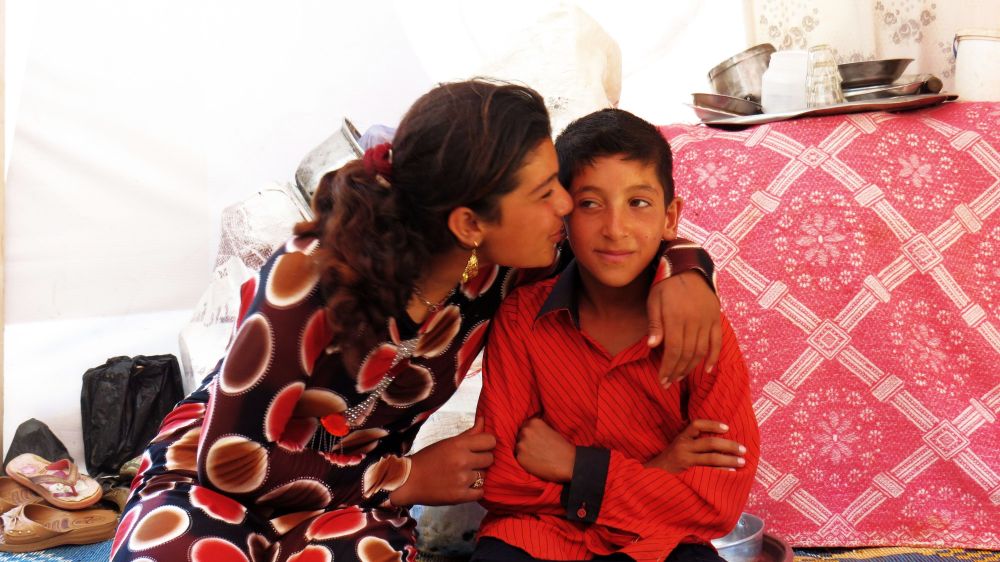
Gharam and Nafeh look after each other after they lost their mother. Photo by Patrick Nicholson/Caritas
Gharam (11) and her brother Nafeh (10) arrived three days ago in Qab Elias, a makeshift settlement of tents for Syrian refugees.
The children fled Syria when a bomb hit their home in Hassakeh in the north-east of Syria. The father managed to rescue Gharam and Nafeh, but their mother and three siblings were killed in the attack.
After three days walking on the road and a day on a bus, they reached the safety of Bekaa Valley in Lebanon. Their father has returned to look after their farm in Syria. They are staying in the tent of a cousin.
“We had a lovely life,” said Gharam. “I went to school. I had friends. I was happy.” The schools closed when the conflict began. Food became scarce and they had to live on bread and water.
“The most frightening thing was the bombing,” she said. Now her school has been destroyed, she has seen the homes of her friends flattened and her family devastated.
“It’s very difficult for us,” she said. “We lost our mum and we loved her. I can’t live without my mum. I need her. We cry all day. My brother is too upset to sleep after all he has seen. I try to comfort him. I tell him not to be afraid. I tell him that I’ll look after him.”
If Gharam could have anything, she says she’d wish for a change of clothes, a telephone so she can call her father to find out how he is and that she could return to her former life. For Nafeh, he wishes for a toy car, a pet bird and “to live in peace”.
Their cousin Abboud takes care of them, along with nine other members of his family. “We try and distract them with games,” he said. “But we will never be able to give them what they need.”
They share the tent with three other families. It’s hot in summer. They don’t have enough food, blankets or mattresses. “Gharam and Nafeh will have to go out to work,” said Abboud. “I cannot support everyone with what I earn. Everyone must help.” They will work harvesting vegetables.
Child refugees travelling alone are very vulnerable to physical and sexual abuse. As well as providing food, bedding, healthcare and clothes to this camp, Caritas social workers search for vulnerable children like Gharam and Nafeh. There are special shelters run by Caritas where the children and vulnerable women can stay.
Alia
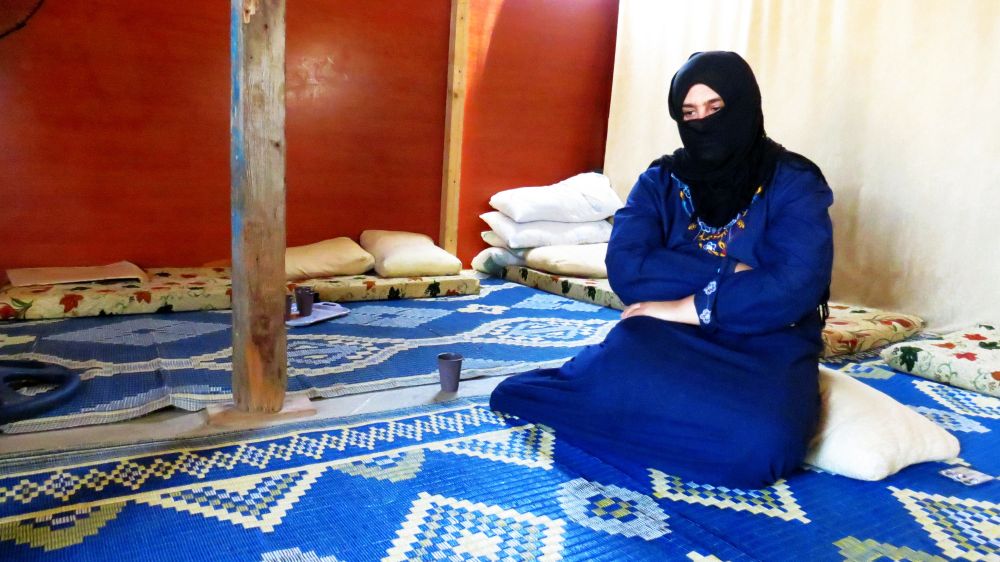
Alia lives with her husband and four children in a shanty village by the beach in Tripoli. Photo by Patrick Nicholson/Caritas.
Cafes line the beach and there is a fairground wheel for people taking a day off to be by the sea from their offices in Tripoli, a major city in the north of Lebanon. But one block back, ramshackle huts have sprung up to house the many Syrian refugees that come to the area.
On what is locally dubbed ‘Corrugated Tin Street’, Alia (40) lives in a small building her husband built from bits of wood and metal donated by local Lebanese families. She lives there with him and four children. The sun beats down on the hot tin roof, but it’s better than in the winter she says, when the cold wind blows through the cracks.
“I want to get a proper apartment,” she said. “We are not protected from the sun or the cold. And I’m always afraid the landowner will kick us off.”
They fled the Syrian city of Homs 21 months ago. “Many of my neighbours died in front of my eyes,” she said. “If you went outside, you could be kidnapped.” One of her Syrian friends returned to Homs to rescue a son who was hiding at the house. The woman was never seen again. They found charred remains and assume she was killed.
“For three months I couldn’t sleep or eat,” said Alia. “I was trembling and half my face was paralysed.”
Although Caritas has helped with food and other aid, life is still tough. Getting money is the priority. Alia’s son needs medical treatment for a spinal problem but their savings are gone. “At the beginning, I could help my neighbours,” she said. “But now I don’t even have enough money for my family.”
Amena
Syrians are not the only refugees in Lebanon. The country is home to over 400,000 Palestinians, half of which live in specially designated camps set up after the 1948 Israeli-Arab War. Now those camps are making space for the Syrians, both Palestinians from Syria as well as Syrians themselves.
Amena (21) is a Syrian refugee living in a camp in Beirut with her husband and two children. They left Aleppo at the start of the year. Life had become impossible. “Food was very expensive,” she said. “Our friends who have stayed say they have to eat grass.”
She shares the tiny apartment in the camp with twenty other people. It will be 21 in a day as her cousin has just given birth that morning. And in a couple of months it will be 22, as Amena is seven months pregnant with her third child.
Amena says that her joy at having a new baby is tinged with worry about how she is going to feed it. “Of course we are happy, but I’m worried about the baby’s future,” she said.
Caritas works in the camps with Syrian refugees providing food parcels and hygiene kits, healthcare and runs activities for the children in the afternoon as none of the children go to school.
“It’s very difficult here,” she said. “There has been no water, there are too many kids, and there is no space or privacy. Once we know the war is over, that same hour we will be back in Syria.”
Siham and Krist
The high thick stone walls of St Gabriel’s Monastery in Mount Lebanon give off a sense of security. The war in Syria seems a long way off as children play in the quiet courtyard and their mothers hang washing out. But the tragedy of Syria is very close to the residents of the monastery, whom Caritas is helping.
It is home to families of Christian Syrian refugees who have fled the country in search of safety. Many are glued to the news from Syria, watching as their beloved country is pulled apart. And others like Siham Aho and her son Krist are still living through their experiences in Syria every day.
On the 29 December, Siham (55), Krist (13) and their father Malak were driving home from their dairy farm when they were attacked by armed men. They stabbed the father and seized the car. As Siham tried to stop the men as they throttled her husband, the thugs rained down blows on her.
“They had guns and their faces were covered. Two of them sat in the back seat and one drove us really fast to a graveyard,” said Krist. “They hit my father with the gun and ripped my mother’s earrings from her ears. They said they were going to cut off her fingers to get her rings but she managed to take them off.”
They had become victims of armed gangs looking to profit out of the chaos that has engulfed Syria. They had all their possessions taken from them and were repeatedly warned that they would be killed. Krist and his family knew that they would be targeted again and so made the decision to abandon their home and seek safety elsewhere.
Now Siham says Krist is suffering from trauma. He has flashbacks of people with long red nails trying to suffocate him. He has phobias about the dark and closed doors, and he has developed nervous ticks.
One of the biggest problems facing Syrian refugees in Lebanon is the psychological damage of their experiences. “Everyone who leaves their country because of conflict is a trauma survivor,” said Caritas Lebanon’s chief psychologist Maureen Mahfouz.
Caritas has psychologists in its centres and outreach workers visiting families to offer counseling and therapy if necessary. People start to think positively after treatment or counseling. Children become happier and say they can’t wait to come back to the sessions.
“Whenever you have a cycle of violence, you need to cut it at some place,” says Maureen Mahfouz. “That’s why we are here – by offering help we stop the violence repeating itself.”

